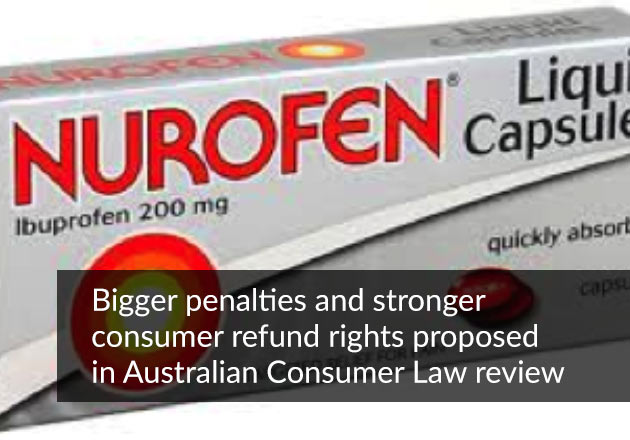
When Nurofen-maker Reckitt Benckiser was found guilty of misleading consumers about its painkillers last year, the news was bittersweet.
How was a $1.7 million penalty adequate for a pharmaceutical giant enjoying $15 billion in sales a year?
What are your consumer rights?
When are you eligible for a repair, replacement or a refund? The Australian Consumer Law gives you more rights than you might know.
Under legislative changes proposed in the Australian Consumer Law Review: Final Report, released on Wednesday, maximum financial penalties would be increased from $1.1 million to at least $10 million per breach.
In this scenario, Reckitt Benckiser, which made misleading claims about “targeted” pain relief, would have been hit with a $60 million penalty.
“The report is terrific news; we’ve been pushing for greater penalties because they have to be of a size that will have an impact and not simply be seen as a cost of doing business,” said Australian Competition and Consumer Commission chairman Rod Sims.
“We were able to increase the Nurofen penalty to $6 million, but I think the public would have wanted a penalty closer to $60 million.”
In its report, Consumer Affairs Australia New Zealand (CAANZ) proposed 18 further legislative changes, which would lead to stronger consumer rights, wipe hazardous products from shelves, and force online sellers to provide accurate prices.
The group, consisting of consumer policy officials, said businesses should ensure products are safe before selling them, as required in countries such as Canada and Singapore.
Some business have argued that this requirement will push up costs, but the report said it will increase their awareness of their responsibility towards providing safe products.
Had this proposal been in place when it took Woolworths to court over knowingly selling unsafe products – such as a fryer with loose handles and a drain cleaner with a faulty safety lid – the ACCC would have had an easy case on its hands.
“This proposal would change that landscape as it would make it illegal to have sold those unsafe goods in the first place,” said Mr Sims. “These are big changes.”
The report also said that it should be easier for consumers to obtain a refund for a faulty product.
It said if a product fails to meet the consumer guarantees within a short specified period of time, the consumer should be able to get a refund or an exchange without needing to prove a “major failure”.
Also, it said the law should be changed so that multiple “non-major” failures were equal to a “major failure”, therefore giving a consumer the right to choose a refund, exchange or opt for a repair.
“If you buy a car and by the time you get it down the street the transmission fails, you’d be entitled to a refund or a replacement without having to show anything else,” said Mr Sims.
“I think these changes plus what we already have are more than what lemon laws can do.”
The report also said that online sellers, including airlines, should be required to show a headline price that includes all extra fees and charges, in a bid to stop consumers being lured by cheap prices, only to be surprised later.
In regards to financial penalties, the report said this should be aligned with competition law. The maximum penalty could be $10 million per contravention, or three times the value of the benefit the company unlawfully gained, or 10 per cent of the annual turnover during the preceding 12 months.
Consumer Affairs Ministers will vote on the proposals in August. If they are supported, the changes will need to be passed by Parliament.
Federal Small Business Minister Michael McCormack said he will soon discuss each proposal.
“While the feedback indicates improvements may be necessary in some areas, evidence from people who use the law every day is that it is working well,” he said.
The Labor opposition said increased maximum penalties was one of its election promises, and it was urgently needed.
“Following on from last week’s Productivity Commission report into the Australian consumer protection regime, there is a clear agenda for reform in the national interest,” said shadow consumer affairs minister Tim Hammond.
“So far we have just seen the Government dither and do nothing. It’s time for meaningful reform.”
